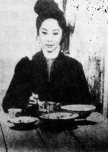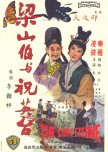
Această recenzie poate conține spoilere
The titular monument looms large over Tang Shu Shuen’s The Arch, not literally but certainly psychically. The film is about a family of 18th century women headed by Madame Tung (Lisa Lu) who house a military captain whose troop has come to protect their village from bandits. Madame Tung, a widowed schoolteacher, is renowned in the community for her generosity and poise in the face of her late husband’s death, and is set to be honored by the Emperor with the erection of a prestigious arch. The arrival of the honorable Captain Yang (a sheepish Roy Chiao) sparks an attraction in both Madame Tung and her daughter Wei-Ling (Hilda Chow Hsuan).However, there is no love triangle in The Arch, because Madame Tung is unwilling to throw aside the reputation she has built even as she struggles internally with her true desire. Even when it seems like something may develop after Madame Tung finds a swoon-worthy romantic poem the captain wrote for her, the poem is just…never mentioned again. This is simply not that kind of film.
Instead, this is an overwhelmingly melancholy mood piece more concerned with the restrictive pressures feudal society places on its female characters. Lu is masterful at balancing the placid benevolence of her town paragon while simultaneously letting the audience in on her deep well of sorrow and longing. In each scene, you see her striving to earn that prestigious arch at the expense of personal happiness, the tug of societal expectation too insurmountable.
Tang’s direction is enormously idiosyncratic and interior, especially when contrasted with the litany of martial arts epics and musicals popular at the time. She masterfully captures small gestures and facial movements from her actors, lingers on scenes of nature, and when the film’s climax arrives she throws that all aside with bold, frenetic choices. It’s the type of film that can be justifiably called visionary.
Considerați utilă această recenzie?

The most subversive element of the film is that both leads are played by women, Betty Loh Ti (with poignant vocals dubbed by Tsin Ting) as the girl disguised as a boy and Ivy Ling Po as the boy she falls in love with. Both are magnificent, so convincing as the yearning heterosexual couple that the casting of two women seems an inextricable part of the story’s message about the role of women in society despite the fact that this is based on a truly heterosexual ancient legend (from roughly 266–420 AD). I have to imagine, or at least hope, that Chinese queer cultural critics have written some fascinating studies of this film, particularly because it seems to be widely considered a populist Chinese classic.
The story continues on irrespective of deeper implications, building to its inevitable, operatic climax bursting with raw emotion (here is where Loh truly shines). The ending is poignant and wistful, and I understood why this story had lasted all these years.
Considerați utilă această recenzie?




